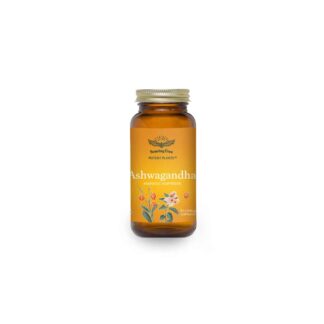Be the first to review “Vegan Omega 3 DHA Derived from Algae” Cancel reply
Vegan Omega 3 DHA Derived from Algae
R499.00
This Vegan Omega 3 DHA supplement provides a natural, plant-based source of DHA and Omega 3 fatty acids, typically found in oily fish. Did you know that Omega 3 actually originates from algae and not fish? Plankton and krill consume algae, small fish feed on plankton, followed by larger fish preying on them, and eventually, these larger fish end up on our plates as human food. By cutting out the middle fish and going straight to the microalgae that produce EPA and DHA, you’re getting the omegas without additional environmental pollutants and potential health risks.
This Vegan Omega 3 supplement (formerly named Absolute Organix Omega Pure) is now part of the All Green collection of thoughtfully formulated health supplements made with high-quality ingredients. It is now packaged in a recyclable plastic container instead of a glass bottle. While the packaging has changed, we fully endorse this product. Read on to learn more about why this supplement stands out and how it can support your health, and the health of our planet.
Instructions for use:
- Adults: 1-2 capsules per day
- Children (age 8-12): 1 capsule per day
- Each capsule contains 500 mg Schizochytrium (Algal) oil equivalent to 200 mg docosahexaenoic acid, Vitamin E (as alpha-tocopherol acetate) 3 mg.
These soft capsules are gelatin-free and are of 100% vegetable origin, making them suitable for vegetarians and vegans. No added gluten, wheat, milk, lactose, soy, eggs and artificial flavourings.
Warnings
Do not exceed the daily dosage level without consulting a registered healthcare provider. If you are pregnant or breastfeeding; or taking any medication, please consult your doctor, pharmacist, or other health professional for advice before taking this medicine.
Is Vegan Omega 3 Algae Oil Better Than Fish Oil?
If you’re wondering how to get your Omega 3s with ease on a plant-based diet have a look at this article from The Physicians Committee for Responsible Medicine. For a more in-depth exploration of this topic, you can find links to published reviews below. Remember to consult with your healthcare professional before considering any dietary supplements.
We are often told that fish is a health food, but with the ever growing number of toxins in our oceans and the proliferation of disease and antibiotics in fish farming, is this actually true? And what about oily fish and fish oil? Are they even healthy for us to begin with?
We perceive fish to be important for us because they contain essential fatty acids such as Omega 3. Essential fatty acids are important for a variety of reasons including regulating blood pressure, immune and inflammatory responses and brain health.
So let’s look into the two main purported benefits of eating fish. Firstly heart health. The idea that consuming oily fish and fish oil is good for heart health has become so widely believed that the fish oil industry is now a multi-billion dollar industry with over 100 thousand tons of fish oil being consumed every single year. However, a meta-analysis conducted by Cochrane, a global non-profit that is regarded among the scientific community as being the gold standard when it comes to the reliability of its reviews, published in the Journal of the American Medical Association (JAMA) looked at 79 randomised trials involving more than 112, 000 people. And concluded that increasing long chain fatty acids from oily fish or fish oil supplements was not associated with a lower risk of all-cause mortality, cardiac death, heart attack or stroke.
The original idea that consumption of oily fish and fish oil is good for the heart came from a study in the 1980’s. However the same group of researchers who conducted the original study, then did a follow up that involved 50% more participants and concluded that those who are advised to eat oily fish, and particularly those supplied with fish oil capsules, had a higher risk of cardiac death. Meaning; even the original study was consequently disproven by the original researchers and when all of the evidence collated, a review published in the Journal of the American Medical Association states: ‘Given this and other negative meta-analyses our job should be to stop highly marketed fish oil supplementation in all of our patients.’
It is also worth noting that fish contains cholesterol which can cause heart disease and on top of this, a 2018 review published by the British Journal of Nutrition found that a higher intake of Omega 3 from plant foods was actually linked to reduced risk of heart disease.
The next purported health benefits of eating fish is related to brain health and cognitive function. Undeniably the consumption of Omega 3 is incredibly important when it comes to brain health, but studies have shown that higher fish consumption has the inverse results. In fact, higher concentrations of fish-based Omega 3s were associated with high levels of cognitive impairment and even dementia. It is thought that this is because of the neurotoxic contaminants found in fish, such as mercury, dioxins and PCBs, which negatively impact not only brain development, but aging brains as well.
It is well known that our oceans are badly polluted and the consumption of fish from the ocean means we too are consuming these chemicals by consuming wild-caught fish. When it comes to farmed fish, they’ve also been shown to be high in contaminants, sometimes even higher than fish caught in the wild. This is due to industrial pollution that is dumped in lakes, rivers and oceans, and because many types of farmed fish such as salmon and sea bass are fed wild-caught fish as food due to them being carnivorous. Whether we choose to consume wild-caught of farmed fish, we’re still ingesting dangerous pollutants and contaminants. Moreover, wild-caught fishing practices are often not sustainable or well-regulated and may lead to overfishing. Overfishing can lead to the collapse of fish stocks, disrupt marine ecosystems, and negatively impact the balance of marine life.
A 2003 report from the Environmental Working Group found that ‘Seven out of ten farmed salmon purchased in grocery stores in several major cities across the US, were contaminated with cancer-causing PCBs at levels that raise health concerns.’ Not only that but huge amounts of antibiotics are used in farmed fish with it being estimated that farmed salmon are fed more antibiotics per pound than any other farmed animal. An investigation by Consumer Reports, found that 60% of frozen shrimp samples contained harmful bacteria such as salmonella, listeria, E.Coli and even MRSA. The levels found with shrimp were higher than previous testing done on chicken, turkey and pork. The issue of pollutants and toxins is so concerning that pregnant and breastfeeding women are advised to moderate or avoid seafood altogether. Yet at the same time, we also paradoxically refer to fish as a health food.
But can you get the Omega 3 fatty acids that you need on a plant-based diet?
The three most important types of Omega 3 fatty acids are ALA, EPA and DHA. ALA is the most common Omega 3 fatty acid in our diet and is found mostly in plant foods, especially foods like flaxseed and chia seeds, which are among the best sources of Omega 3 on the planet. It’s also found in walnuts, hemp, kale, spinach, soy beans and many more. Unlike fish, these foods are healthy and safe for everyone, at all stages of life and do not pose a risk to pregnant women or their unborn children.
EPA and DHA are found most notably in fish and seafood. However, vegans get DHA and EPA by their body creating it through converting the ALA they get from their diet. There has been some speculations that because the rate of conversion appear low, those on a plant-based diet are unable to convert the required amounts necessary to be healthy, with the conversion rate of ALA to DHA being somewhere around 3 to 5% on average. However, according to the FDA a 3oz serving of canned tuna provides around 170mg of DHA, but a 20g serving of flaxseed, working on a conversion ratio of 4%, will provide around 190mg of DHA.
According to the findings of a study looking at over 14 400 men and women, which is published in the American Journal of Clinical Nutrition, even though vegans have lower intakes of EPA and DHA the blood levels of both were approximately the same as regular fish eaters. This indicated that when people do not consume EPA and DHA their bodies respond by increasing the conversion levels from their intake of ALA. That being said, if you are concerned about EPA and DHA you can get them from foods like marine phytoplankton or in the form of an algae supplement, which is no different to taking a fish oil supplement, except it removes all of the harmful chemicals, pollutants, environmental consequences and the needless death of an animal, while providing the positive health benefits of consuming the essential long chain fatty acids that we require.






Reviews
There are no reviews yet.